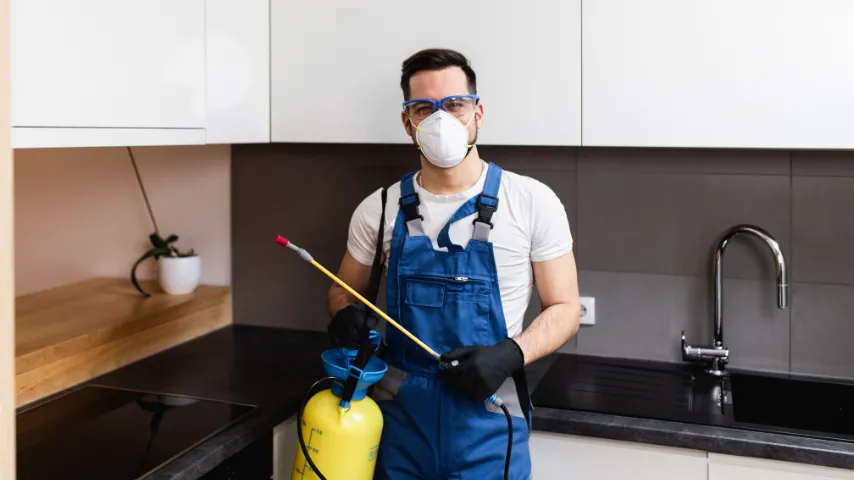The Hidden Dangers Lurking in Your Home: Why Pest Control is a Must

Best Pest Control Services Near Me
Homeowners strive to create a safe and comfortable living environment for themselves and their families. However, many people fail to realize that hidden dangers are lurking within the confines of their homes. We're not talking about ghosts or monsters but rather pests – the tiny creatures that can wreak havoc on your health, property, and peace of mind. In this article, we'll explore the importance of pest control and why it should be a priority for every homeowner.
1. Introduction
Your abode serves as a haven, an oasis of tranquility where you can bask in a cocoon of serenity and complete assurance. Unfortunately, insects, rodents, and termites can invade your living space, posing severe health risks. From spreading diseases to causing structural damage, these unwelcome guests can turn your dream home into a nightmare. Pest control is essential to maintain a healthy and pest-free environment.
2. The Importance of Pest Control
2.1 Protecting Your Health
Pests are not just a nuisance; they can also be carriers of various diseases. Cockroaches, for example, are known to spread bacteria and allergens that can trigger asthma and allergies. On the other hand, bed bugs can cause itchy bites and disrupt sleep, leading to fatigue and decreased productivity. Ants and rodents can contaminate your food, putting you at risk of foodborne illnesses. Regular pest control treatments can help safeguard your health and prevent these health hazards.
2.2 Safeguarding Your Property
If pests are not controlled, they can cause significant damage to your property. Termites, for instance, are notorious for feeding on wood and can weaken the structural integrity of your home. Rodents can gnaw on electrical wires, leading to potential fire hazards. By investing in pest control, you can protect your property from costly repairs and ensure its longevity.
2.3 Preventing Structural Damage
In addition to the damage caused by termites, other pests can also compromise the integrity of your home. Carpenter ants can hollow out wooden structures, while rodents can create burrows in walls and attics, weakening structures. Over time, this can result in sagging ceilings, warped floors, and other serious structural issues. By implementing effective pest control measures, you can prevent such damage and maintain the structural integrity of your home.
3. Common Household Pests
To understand the importance of pest control, it's essential to familiarize yourself with the common pests that may invade your home. Below are several of the prevailing pests typically found in households:
3.1 Cockroaches
Cockroaches, being creatures of the night, flourish in environments characterized by warmth and moisture. They are unsightly and can also carry harmful bacteria and allergens, threatening your health.
3.2 Bed Bugs
Bed bugs are tiny parasites that feed on human blood while you sleep. Being bitten by them may result in itchiness, discomfort and potentially trigger allergic responses. These pests are notoriously difficult to eliminate without professional intervention.
3.3 Ants
Ants are social insects that can quickly infest your home for food and water. While most species are harmless, some, like carpenter ants, can cause significant structural damage.
3.4 Termites
Termites are wood-destroying insects that can silently eat away at the wooden structures of your home. They can cause severe damage, often not detected until too late.
3.5 Rodents
Rodents, such as mice and rats, can carry diseases and cause extensive damage by gnawing on wires, insulation, and building materials. Their presence should always be considered.
4. Signs of Pest Infestation
Detecting a pest infestation early is crucial for effective pest control. Here are some common signs that indicate your home may be infested:
4.1 Visible Pest Sightings
Seeing pests, whether it's cockroaches scurrying across your kitchen floor or rodents darting through your attic, clearly indicates an infestation.
4.2 Damage to Property
Damaged furniture, chewed wires, holes in walls, or gnaw marks on wooden structures are all signs of pest activity and should be addressed promptly.
4.3 Unusual Odors
Foul or musty odors in some regions of your home, especially in hidden spaces, can indicate the presence of pests, such as rodents or mold, caused by excessive moisture.
4.4 Pest Droppings or Nests
Finding droppings, nests, or shredded materials in your home indicates that pests have made themselves comfortable in your living space.
5. DIY vs. Professional Pest Control
When faced with a pest problem, many homeowners wonder if they should tackle it themselves or hire professional pest control services. Here are some essential factors to take into account:
5.1 Pros and Cons of DIY Pest Control
DIY pest control methods, such as store-bought sprays or traps, may provide temporary relief. However, they often fail to address the root cause of the infestation and may not be as effective as professional treatments.
5.2 Benefits of Professional Pest Control
Professional pest control services offer numerous advantages. They have the knowledge, experience, and resources to identify the specific pest species and implement targeted treatments. Professionals can also provide ongoing prevention strategies to minimize the risk of future infestations.
6. Choosing the Right Pest Control Service Provider
Selecting the right pest control service provider is crucial for successful pest management. Take into account the following factors when reaching your decision.
6.1 Expertise and Experience
Look for a company with a proven track record and experienced technicians knowledgeable about different pests and the most effective control methods.
6.2 Range of Services
Choose a pest control service provider that offers a comprehensive range of services to address different types of pests. This ensures that a single provider can meet all your pest control needs, saving you time and effort.
6.3 Safety Measures
Ensure the pest control company follows strict safety protocols to protect your family, pets, and the environment. Please inquire about the products they use and ask for information regarding their safety and potential risks.
6.4 Customer Reviews and Reputation
Research customer reviews and testimonials to gauge the reputation of the pest control service provider. Positive feedback and recommendations from satisfied customers can give you confidence in their services.
7. The Pest Control Process
Effective pest control involves systematically identifying, treating, and preventing infestations. Here's a general overview of the pest control process:
7.1 Inspection and Identification
A professional pest control technician will thoroughly inspect your property to identify the type of pests present, assess the extent of the infestation, and determine the underlying causes.
7.2 Treatment Plan
Based on the inspection findings, a customized treatment plan will target the specific pests and address the infestation effectively. The plan may include a combination of chemical treatments, traps, exclusion methods, and preventive measures.
7.3 Pest Extermination
The chosen pest control methods will be implemented to eliminate the pests from your home. This may involve the application of pesticides, baiting systems, or using non-toxic alternatives, depending on the nature of the infestation and your preferences.
7.4 Follow-Up and Prevention
Pest control is an ongoing process, and follow-up visits are crucial to ensure the effectiveness of the treatment. Regular inspections and preventive measures will be implemented to prevent future infestations and maintain a pest-free environment.
8. Conclusion
Pest control is not just about eliminating annoying pests; it is about safeguarding your health, protecting your property, and ensuring the comfort of your home. By recognizing the hidden dangers of pests and taking proactive measures to control them, you can create a safe and healthy living space for you and your family.
Don't let pests take over your home. Invest in professional pest control services to tackle infestations effectively and prevent future problems. Choose a reputable pest control service provider like RightCliq.in, which offers top-notch services at your doorstep. Call us now at 8884009090 to schedule an appointment and reclaim your home from these hidden dangers.
FAQs
1. How frequently should I arrange pest control treatments?
It depends on the severity of the infestation and the recommendations of the pest control experts. In most cases, regular treatments every few months are sufficient to maintain a pest-free environment.
2. Are the chemicals used in pest control treatments safe for my family and pets?
When applied correctly, the chemicals used by professional pest control companies are approved and regulated, ensuring their safety. They follow strict guidelines to protect your family and pets from any harm.
3. Can I prevent pests on my own without professional help?
While some preventive measures can be taken independently, professional pest control is essential for thorough and effective pest eradication and long-term prevention.
4. How do I know if a pest control service provider is reliable?
Research their reputation, read customer reviews, and inquire about their experience, licenses, and certifications. A reliable provider will have a good track record and be transparent about their services.
5. How long does a pest control treatment take?
The length of the treatment is influenced by different aspects, such as the property's size, the extent of the infestation, and the particular pest control techniques employed. A treatment session can take anywhere from a few hours to a full day.
Conclusion
Protecting your home from pests is not just a matter of convenience; it's a crucial step in ensuring the health and safety of your family. The hidden dangers within your home can pose serious risks, from spreading diseases to causing structural damage. That's why pest control should be a top priority for every homeowner.
You can create a pest-free environment by understanding the importance of pest control, recognizing the signs of infestation, and taking proactive measures. Whether it's cockroaches, bed bugs, ants, termites, or rodents, addressing the issue promptly and effectively is essential.
Regarding pest control, it's best to rely on professionals with the expertise, experience, and resources to tackle the problem comprehensively. RightCliq.in is a leading pest control service provider that offers reliable and effective solutions at your doorstep. With their team of skilled technicians and a range of services, you can trust them to eliminate pests and keep your home safe.
Don't let pests take over your home. Take action now and reclaim your living space. Contact RightCliq.in at 8884009090 and say goodbye to the hidden dangers lurking in your home.
FAQs
1. How often should I schedule professional pest control services?
The frequency of professional pest control treatments depends on various factors, such as the type of pests, the level of infestation, and the experts' recommendations. It is generally recommended to have regular treatments every few months to ensure long-term prevention.
2. Can I try DIY methods before calling professional pest control services?
While DIY methods can provide temporary relief, they may not effectively address the root cause of the infestation. Professional pest control services have the knowledge, experience, and specialized tools to handle different pests and ensure thorough eradication.
3. Are the treatments provided by professional pest control safe for children and pets?
Yes, reputable pest control service providers prioritize the safety of your family and pets. They use approved and regulated chemicals and employ techniques that minimize any risks. It's essential to follow any instructions professionals provide for post-treatment safety precautions.
4. How can I prevent pests from entering my home?
To prevent pests, maintain cleanliness and proper hygiene in your home. Seal cracks or openings, store food properly, eliminate standing water sources, and maintain a clutter-free environment. Get top exterminators to make your living place pest free in regular inspections in Bangalore and professional preventive treatments can also help keep pests at bay.
















